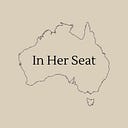Sue Ellery: For a better community
“I took the view that the way to influence those public policy decisions was to get in there and be a public policymaker myself.”
Almost 100 years ago, Edith Cowan became the first woman elected to an Australian parliament, in March 1921.
In Her Seat is asking as many currently serving female politicians as we can how they view gender equality, politics and their impact.
This is a non-partisan project that is soliciting contributions from women in all parties, or none at all, in every parliament.
Sue Ellery is a Member of the Legislative Council in the Western Australian Parliament, she’s the Leader of the Government in the Chamber and the Minister for Education and Training.
Sue was first elected in 2001 and served as a minister towards the end of the Carpenter Government and then in social policy-focused shadow roles.
Before Parliament, Sue worked in the union movement, including with Julia Gillard. With a focus on low-paid workers, often women, and their clients, she has sought to elevate their voices and bring issues facing these workers to the front.
Sue’s passion for education and service was clear when we spoke to her.
And for those that follow her on social media, watch out for a Sue Ellery selfie.
What does gender equality mean to you?
Gender equality means that there are no barriers or obstacles that are based on gender.
It might be that there are barriers and obstacles but they may be based on other things, such as a lack of talent, but that gender itself is not a barrier to achievement in whatever field that may be.
Which female politicians have inspired or encouraged you?
At a local level, there were two.
One was the late Senator Patricia Giles. She was one of the first senators that took their workload to the community. She placed her office in Joondalup, in the northern suburbs of Perth. Her staff worked closely with the local community this was back when the northern suburbs were growing and Joondalup, in particular, was new.
There were lots of young families there and not that many services or connection point to help them access community services.
Pat Giles made it her business for her office to facilitate this.
At the same time, Pat at the national and international level she pursued really serious issues like world peace.
Pat was a very softly spoken but assertive and hard-working person.
One of her staff Cheryl Davenport, who went on to become an MP herself. Cheryl was active in leading abortion law reform for Western Australia.
Both Cheryl and Pat encouraged me to run for Parliament.
Julia Gillard was a contemporary of mine when I was involved in student politics we both held positions in what was called the Australian Union of Students. We both worked out of the head office in Melbourne, we have known each other since were 19 or 20.
When she was Minister for Education and the Prime Minister her work ethic was like none I have ever seen. She had the capacity to stay calm and measured under enormous pressure, unlike anything I have ever seen before or since.
She maintained her sense of humour — she is a really funny person.
The capacity to keep it together under ridiculous and enormous personal pressure continues to be something I strive to do myself.
What inspires you to serve your community?
I want to live in a better community.
I took the view that the way to influence those public policy decisions was to get in there and be a public policymaker myself.
I was a wide-eyed university student wanting to make the world a better place and it seemed to be the most effective way for me to do that was to through a political party.
My parents were members of the Liberal Party they even met at a Young Liberals event.
Politics was always discussed around our kitchen table. My parents encouraged us to have a point of view and defend that point of view.
What are the most important contributions you are making in Parliament?
I think there are two contributions I am making.
Firstly, I am the Leader of the Government in the Legislative Council, showing younger women that they can hold serious leadership positions in the Parliament.
Secondly, in a policy sense given the portfolios that I’ve held since I was elected in both opposition and government, I’ve worked hard to work with stakeholders to make a difference.
I was first appointed a minister at the end of the Carpenter Government, I was minister for 17 months. What that taught me was that you actually don’t have that much time, you don’t know how much time you have got and you have got to get on and get things done.
What is next for gender equality in politics?
All parties have to put measurable gender targets in place and there need to be consequences if they don’t make those targets.
The Labor Party has long had affirmative action policies. The other major parties need to do something about that. Proportionate gender representation doesn’t happen just in and of itself, it happens from determined, considered and deliberate policies.
It happens because people at a specific time made a decision to make it happen.
Put a plan in place, implement the plan.
Until more parties in Australia do that I don’t see the composition of our parliaments changing too much.
In Her Seat interviews can be accessed here
